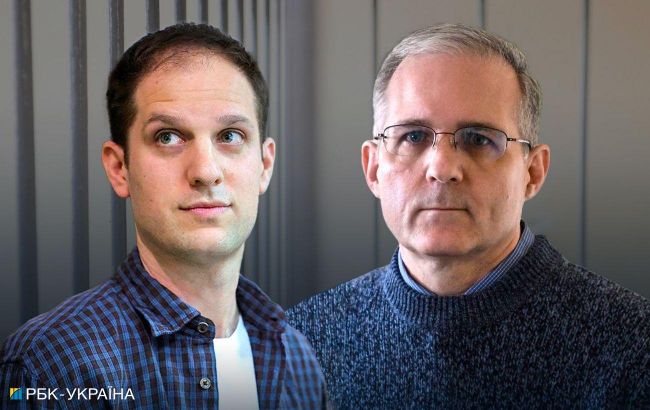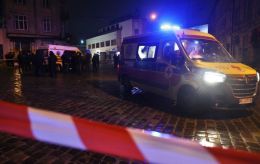Major swap: Why Russia released prisoners to West and its link to war in Ukraine
 Photo: Paul Whelan and Evan Gershkovich (collage by RBC-Ukraine)
Photo: Paul Whelan and Evan Gershkovich (collage by RBC-Ukraine)
On the first day of August, a prisoner exchange took place between Russia, the USA, and Germany, which the Western press has already dubbed the largest since the Cold War. Among those released from Russian prisons were Americans Paul Whelan and Evan Gershkovich, while Vadim Krasikov, a convicted killer, was among those returned to Russia.
Why Russia agreed to this exchange, whether it is related to the war in Ukraine, and how Türkiye benefits from it read in the material by RBC-Ukraine.
Who was exchanged and why Russia agreed
Although the main participants in the exchange were Russia, the USA, and Germany, Poland, Slovenia, Norway, and Belarus were also involved. People who were imprisoned in these seven countries were released today.
In addition to Paul Whelan and Evan Gershkovich, the Russians freed Russian-American journalist Alsu Kurmasheva of Radio Free Europe, as well as several opposition figures, including Vladimir Kara-Murza, Ilya Yashin, and members of the late Alexei Navalny’s team. Navalny was also planned to be part of the exchange, but his death prevented this.
In return, the Kremlin brought Vadim Krasikov, a killer imprisoned in Germany, back to Russia. Krasikov was sentenced for the 2019 murder of former Chechen commander Zelimkhan Khangoshvili in Germany. Additionally, as part of the exchange with the West, Russia received several Russian spies and intelligence agents.
A total of 24 people were exchanged. The full list can be found via the provided link.
According to political scientist Volodymyr Fesenko, this so-called historic exchange, as labeled by the Western press, was the result of negotiations between the USA and Russia that lasted at least a year and a half. The main reason Russia agreed to this exchange was Krasikov, the killer.
“But the key reason Russia agreed to this exchange, even though it wasn’t entirely equivalent, is Krasikov - a professional killer. This is Putin’s personal position. He raised this issue through various intermediaries, as reported by American media. This was a key condition of the exchange. The rest was just a list of people. The Americans wanted Whelan and Gershkovich to be released. That’s the essence of the exchange,” he told RBC-Ukraine.
As CNN reported, regarding Krasikov, the Biden administration conducted separate negotiations with Berlin. One of these discussions took place in February at the Munich Security Conference between Vice President Kamala Harris and Chancellor Olaf Scholz. In response to today’s exchange, Berlin stated that releasing Krasikov was a difficult decision.
Additionally, Fesenko noted that this exchange sent a signal to Russian agents in the West that they have nothing to fear because the Kremlin can extract them if necessary. This is particularly important amid the current hybrid war between Russia and the West.
“So, this is very professionally done by Russia. And Biden secured the release of American citizens plus Russian opposition figures. Everything is fine from a values perspective; everyone got what they wanted,” the political scientist explained.
According to Fesenko, this exchange demonstrates that Putin is indifferent to Russian opposition figures or foreigners held by Russia. Western citizens should be cautious about visiting Russia to avoid becoming the next hostages, who might then be used along with opposition figures as "bargaining material."
“This has become a standard practice. Russian opposition figures are material for exchange. But Russian spies, professional intelligence agents, and professional killers are considered important and valuable human assets for Putin, for whom he is willing to make agreements, including with Biden,” added Fesenko.
Is the exchange related to Ukraine
Amid today’s exchange, theories have emerged suggesting a connection to the war in Ukraine, with claims that Russia is signaling its willingness to negotiate an end to its aggression. However, Fesenko believes that the prisoner exchange between the West and Russia is not related to Ukraine.
“I do not share the view that this is a prelude to any major agreements on ending the war. Nothing of the sort. It will not lead to the end of the war. This is a conspiracy theory. It does not mean there are any behind-the-scenes agreements about ending the war. That is my opinion,” he said in a comment to RBC-Ukraine.
The role of Türkiye in the exchange
Today’s prisoner exchange took place with Türkiye acting as the mediator, at Ankara’s airport.
The Turkish intelligence agency stated that their organization played the main mediating role in this operation.

According to Fesenko, this exchange further highlighted Türkiye and its leader Recep Tayyip Erdoğan’s effectiveness as a mediator in negotiations with Russia.
“Erdoğan has once again demonstrated that he is the most effective mediator in complex negotiations between Russia and the West or between Russia and Ukraine. Therefore, Erdoğan’s stakes as a mediator in future peace talks are rising,” the political scientist believes.
Fesenko explained that Türkiye is a unique country with not just friendly but partnership relations with both warring states. This, he says, gives Türkiye an advantage in mediation, making it more neutral compared to, for example, China, which is more of a Russian “second” than a mediator.
“However, this doesn’t guarantee that Türkiye will be the mediator, but this exchange has confirmed that Türkiye already has significant experience and concrete results. Therefore, its chances of playing the role of mediator are increasing,” Fesenko concluded.
Sources: publications from CNN, TRT Haber, The Insider, statements from Western officials, and comments from political scientist Volodymyr Fesenko.

